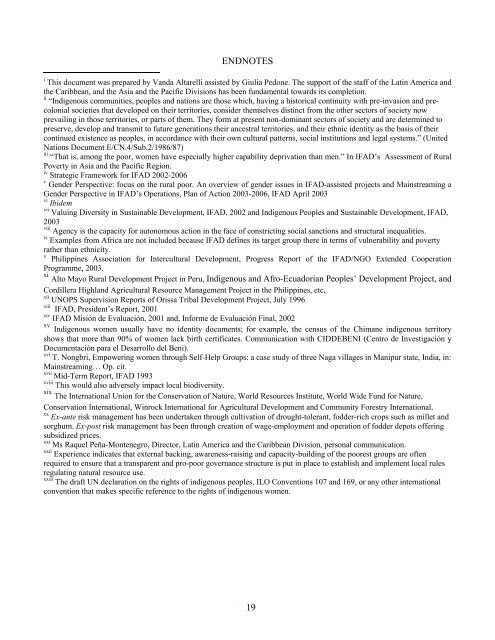Enhancing the Role of Indigenous Women in Sustainable ...
Enhancing the Role of Indigenous Women in Sustainable ...
Enhancing the Role of Indigenous Women in Sustainable ...
Create successful ePaper yourself
Turn your PDF publications into a flip-book with our unique Google optimized e-Paper software.
ENDNOTES<br />
i This document was prepared by Vanda Altarelli assisted by Giulia Pedone. The support <strong>of</strong> <strong>the</strong> staff <strong>of</strong> <strong>the</strong> Lat<strong>in</strong> America and<br />
<strong>the</strong> Caribbean, and <strong>the</strong> Asia and <strong>the</strong> Pacific Divisions has been fundamental towards its completion.<br />
ii “<strong>Indigenous</strong> communities, peoples and nations are those which, hav<strong>in</strong>g a historical cont<strong>in</strong>uity with pre-<strong>in</strong>vasion and precolonial<br />
societies that developed on <strong>the</strong>ir territories, consider <strong>the</strong>mselves dist<strong>in</strong>ct from <strong>the</strong> o<strong>the</strong>r sectors <strong>of</strong> society now<br />
prevail<strong>in</strong>g <strong>in</strong> those territories, or parts <strong>of</strong> <strong>the</strong>m. They form at present non-dom<strong>in</strong>ant sectors <strong>of</strong> society and are determ<strong>in</strong>ed to<br />
preserve, develop and transmit to future generations <strong>the</strong>ir ancestral territories, and <strong>the</strong>ir ethnic identity as <strong>the</strong> basis <strong>of</strong> <strong>the</strong>ir<br />
cont<strong>in</strong>ued existence as peoples, <strong>in</strong> accordance with <strong>the</strong>ir own cultural patterns, social <strong>in</strong>stitutions and legal systems.” (United<br />
Nations Document E/CN.4/Sub.2/1986/87)<br />
iii “That is, among <strong>the</strong> poor, women have especially higher capability deprivation than men.” In IFAD’s Assessment <strong>of</strong> Rural<br />
Poverty <strong>in</strong> Asia and <strong>the</strong> Pacific Region.<br />
iv Strategic Framework for IFAD 2002-2006<br />
v Gender Perspective: focus on <strong>the</strong> rural poor. An overview <strong>of</strong> gender issues <strong>in</strong> IFAD-assisted projects and Ma<strong>in</strong>stream<strong>in</strong>g a<br />
Gender Perspective <strong>in</strong> IFAD’s Operations, Plan <strong>of</strong> Action 2003-2006, IFAD April 2003<br />
vi Ibidem<br />
vii Valu<strong>in</strong>g Diversity <strong>in</strong> Susta<strong>in</strong>able Development, IFAD, 2002 and <strong>Indigenous</strong> Peoples and Susta<strong>in</strong>able Development, IFAD,<br />
2003<br />
viii<br />
Agency is <strong>the</strong> capacity for autonomous action <strong>in</strong> <strong>the</strong> face <strong>of</strong> constrict<strong>in</strong>g social sanctions and structural <strong>in</strong>equalities.<br />
ix<br />
Examples from Africa are not <strong>in</strong>cluded because IFAD def<strong>in</strong>es its target group <strong>the</strong>re <strong>in</strong> terms <strong>of</strong> vulnerability and poverty<br />
ra<strong>the</strong>r than ethnicity.<br />
x<br />
Philipp<strong>in</strong>es Association for Intercultural Development, Progress Report <strong>of</strong> <strong>the</strong> IFAD/NGO Extended Cooperation<br />
Programme, 2003.<br />
xi Alto Mayo Rural Development Project <strong>in</strong> Peru, <strong>Indigenous</strong> and Afro-Ecuadorian Peoples’ Development Project, and<br />
Cordillera Highland Agricultural Resource Management Project <strong>in</strong> <strong>the</strong> Philipp<strong>in</strong>es, etc.<br />
xii UNOPS Supervision Reports <strong>of</strong> Orissa Tribal Development Project, July 1996<br />
xiii IFAD, President’s Report, 2001<br />
xiv IFAD Misión de Evaluación, 2001 and, Informe de Evaluación F<strong>in</strong>al, 2002<br />
xv <strong>Indigenous</strong> women usually have no identity documents; for example, <strong>the</strong> census <strong>of</strong> <strong>the</strong> Chimane <strong>in</strong>digenous territory<br />
shows that more than 90% <strong>of</strong> women lack birth certificates. Communication with CIDDEBENI (Centro de Investigación y<br />
Documentación para el Desarrollo del Beni).<br />
xvi T. Nongbri, Empower<strong>in</strong>g women through Self-Help Groups: a case study <strong>of</strong> three Naga villages <strong>in</strong> Manipur state, India, <strong>in</strong>:<br />
Ma<strong>in</strong>stream<strong>in</strong>g… Op. cit.<br />
xvii Mid-Term Report, IFAD 1993<br />
xviii This would also adversely impact local biodiversity.<br />
xix The International Union for <strong>the</strong> Conservation <strong>of</strong> Nature, World Resources Institute, World Wide Fund for Nature,<br />
Conservation International, W<strong>in</strong>rock International for Agricultural Development and Community Forestry International.<br />
xx Ex-ante risk management has been undertaken through cultivation <strong>of</strong> drought-tolerant, fodder-rich crops such as millet and<br />
sorghum. Ex-post risk management has been through creation <strong>of</strong> wage-employment and operation <strong>of</strong> fodder depots <strong>of</strong>fer<strong>in</strong>g<br />
subsidized prices.<br />
xxi Ms Raquel Peña-Montenegro, Director, Lat<strong>in</strong> America and <strong>the</strong> Caribbean Division, personal communication.<br />
xxii Experience <strong>in</strong>dicates that external back<strong>in</strong>g, awareness-rais<strong>in</strong>g and capacity-build<strong>in</strong>g <strong>of</strong> <strong>the</strong> poorest groups are <strong>of</strong>ten<br />
required to ensure that a transparent and pro-poor governance structure is put <strong>in</strong> place to establish and implement local rules<br />
regulat<strong>in</strong>g natural resource use.<br />
xxiii The draft UN declaration on <strong>the</strong> rights <strong>of</strong> <strong>in</strong>digenous peoples, ILO Conventions 107 and 169, or any o<strong>the</strong>r <strong>in</strong>ternational<br />
convention that makes specific reference to <strong>the</strong> rights <strong>of</strong> <strong>in</strong>digenous women.<br />
2121 19 19

















